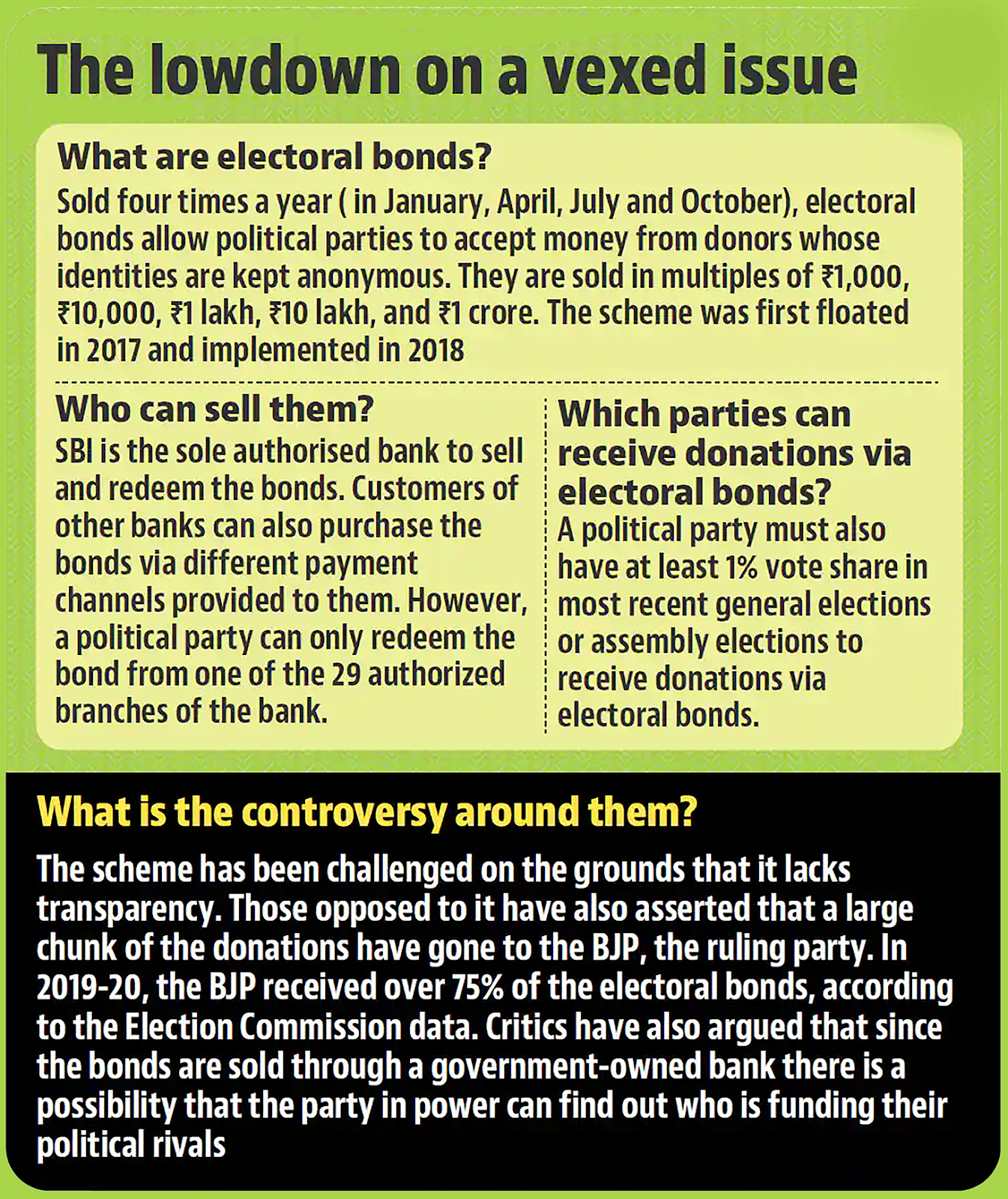Governance
Amendments in Electoral Bond Scheme
- 08 Nov 2022
- 7 min read
For Prelims: Electoral bonds, Criminalization of Politics, Electoral Bond Scheme, Registered Political Party, Representation of the People Act, 1951
For Mains: Electoral Bonds, Elections Funding
Why in News?
Weeks ahead of elections in certain states, the Central Government has amended the Electoral Bond Scheme.
What is the Electoral Bond Scheme?
- Electoral Bonds:
- Electoral bonds are money instruments like promissory notes, which can be bought by companies and individuals in India from the State Bank of India (SBI) and donated to a political party, which can then encash these bonds.
- The bonds are only redeemable in the designated account of a registered political party.
- A person being an individual can buy bonds, either singly or jointly with other individuals.
- Electoral Bond Scheme:
- Electoral Bonds Scheme was launched in 2018 to to cleanse the political funding in India.
- The central idea behind the electoral bonds scheme is to bring about transparency in electoral funding in India.
- The government had described the scheme as an “electoral reform” in a country moving towards a “cashless-digital economy”.
What are the Amendments Made to the Scheme?
- Additional Period of 15 Days:
- Introduced a new para, stating that an additional period of fifteen days shall be specified by the Central Government in the year of general elections to the Legislative Assembly of States and Union territories with Legislature.
- In 2018, when the Electoral Bond Scheme was introduced, these bonds were made available for a period of 10 days each in January, April, July and October, as may be specified by the central government.
- An additional period of 30 days was to be specified by the Central Government in the year of the General election to the House of People.
- Validity:
- The Electoral Bonds shall be valid for fifteen calendar days from the date of issue and no payment shall be made to any payee Political Party if the Electoral Bond is deposited after expiry of the validity period.
- The Electoral Bond deposited by an eligible Political Party in its account shall be credited on the same day.
- Eligibility:
- Only the political parties registered under Section 29A of the Representation of the People Act, 1951 which secured at least 1% of votes polled in the last General Election to the Lok Sabha or the State Legislative Assembly are eligible to receive Electoral Bonds.
What are the Concerns Regarding Electoral Bonds?
- Contradicting its Basic Idea:
- The central criticism of the electoral bonds scheme is that it does the exact opposite of what it was meant to do: bring transparency to election funding.
- For example, critics argue that the anonymity of electoral bonds is only for the broader public and opposition parties.
- Possibility of Extortion:
- The fact that such bonds are sold via a government-owned bank (SBI) leaves the door open for the government to know exactly who is funding its opponents.
- This, in turn, allows the possibility for the government of the day to either extort money, especially from the big companies, or victimise them for not funding the ruling party — either way providing an unfair advantage to the party in power.
- A Blow to Democracy:
- Through an amendment to the Finance Act 2017, the Union government has exempted political parties from disclosing donations received through electoral bonds.
- This means the voters will not know which individual, company, or organization has funded which party, and to what extent.
- However, in a representative democracy, citizens cast their votes for the people who will represent them in Parliament.
- Compromising Right to Know:
- The Supreme Court of India has long held that the “right to know”, especially in the context of elections, is an integral part of the right to freedom of expression (Article 19) under the Indian Constitution.
- Against Free & Fair Elections:
- The bonds provide no details to the citizens but said anonymity does not apply to the government, which can always access the donor details by demanding the data from the State Bank of India (SBI).
- This implies that the government in power can leverage this information and disrupt free and fair elections.
- Crony Capitalism:
- The electoral bonds scheme removes all pre-existing limits on political donations and effectively allows well-resourced corporations to fund elections, subsequently paving the way for crony capitalism.
- Crony Capitalism is an economic system characterized by close, mutually advantageous relationships between business leaders and government officials.
- The electoral bonds scheme removes all pre-existing limits on political donations and effectively allows well-resourced corporations to fund elections, subsequently paving the way for crony capitalism.
Way Forward
- There is a need for effective regulation of political financing along with bold reforms to break the vicious cycle of corruption and erosion of quality of democratic polity.
- It is crucial to plug the loopholes in the current laws to make the entire governance machinery more accountable and transparent.
- Voters can also help bring in substantial changes by demanding awareness campaigns. If voters reject candidates and parties that overspend or bribe them, democracy would move a step higher.





